Please, Please Me: Artists recreate The Beatles' debut
- Published
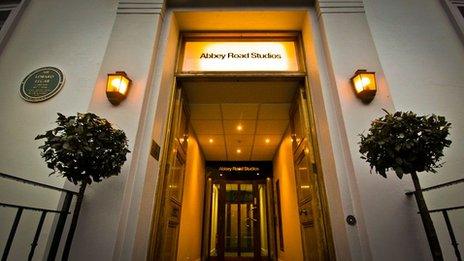
The spiritual home of the The Beatles was the building's Studio Two
Artists including Joss Stone, Mick Hucknall and Beverley Knight successfully re-recorded Please, Please Me, the debut album by The Beatles, in a day-long session organised by BBC Radio 2.
Fifty years ago. The Beatles may not have known the album they were about to record would introduce to the world a British band who would help change the face of modern music.
The artists who, on a snowy February morning in 2013, are re-recording the same 11 tracks in the 12 hours it took the Fab Four to lay down the album aren't changing the world perhaps - but they are taking part in a one-off event.
Gabrielle Aplin, the first to arrive at the historical Abbey Road studio in north-west London was born 22 years after the band's acrimonious split in 1970.
Gabrielle Aplin performs There's A Place by The Beatles.
As the youngest artist taking part in the recording, it is fitting that the singer, who had her first hit at Christmas should, deliver the opening performance.
George Harrison was himself just 20 years old at the time he, John, Paul and Ringo drove up to the studio and unloaded their van and, like him, Aplin carried her own guitar through the front doors of Abbey Road.
Mirroring a Beatles recording later in their career, the Stereophonics arrive mid-morning in the back of a Rolls Royce with BBC Radio 2 breakfast DJ Chris Evans.
Busking
Singer Kelly Jones and Evans even go so far as busking a short version of I Saw Her Standing there in the snow outside.
Little money is raised however, partly due to the brevity of the set and partly due to a few fluffed lines from the presenter.
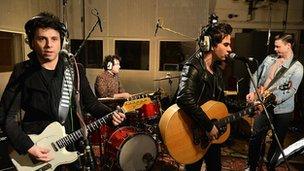
I Saw Her Standing There has been covered by a range of artists from The Who to pop princess Tiffany
The regular crowd of tourists who gather, even in such cold weather, to recreate the famous pedestrian crossing cover of the Beatles' Abbey Road album look on, bemused.
"He gave me a lift in his big Roller, which was nice, and we thought we'd do it for a laugh in the snow," says Jones - adding he was not overawed at the prospect of such a tight turnaround in the studio between bands.
"Our first album was very quick because we had to do it in between tours.
"What I like about the first few Beatles albums, is like when you save up your money as a kid to do your first few demos, you need nine or 10 songs in one day and what you end up trying to capture is the energy of the band.
"It's something you forget about in the later records when they layer it all up with production."
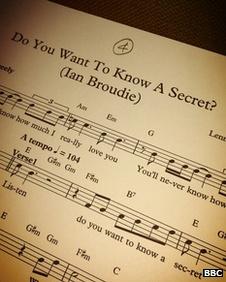
The songs were each given a new spin by the guest performers
In 1963, both record industry convention and time restraints dictated that The Beatles record a number of cover versions for Please Please Me (six in total) - which accounts for its low standing in the band's back catalogue.
"It's not the best Beatles album," says BBC 6 music presenter Stuart Maconie. "But it's the first Beatles album.
"It's the first album of the rock era, really. That's what people forget. It was all about singles and it was the first self-contained album and it did change the whole rock era."
Studio improvisation
Prior to the Stereophonics' barnstorming studio version of I Saw Her Standing There, soul singer Joss Stone sits at the piano to rehearse a few bars of Taste of Honey, which was itself another Beatles cover version.
For a few minutes, the muse has entered the studio as Stereophonics guitarist Adam Zindani almost absentmindedly begins to accompany the singer, improvising around the jazzy piano from the other side of Studio Two.
As the studio techs busy around tightening screws, moving lights and adjusting mic heights, a few people stop for a second to watch.
Dotted around Abbey Road Studios are photos of bands who have recorded there over the years, which can lead to some incongruous pairings on the walls.
Cliff Richard gazes out over stairs next to a picture of Stevie Wonder, while the Spice Girls sit next to Eric Clapton.
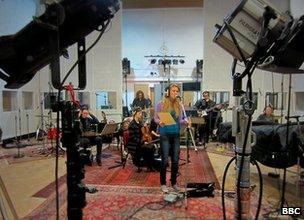
Joss Stone went shoeless for her rendition of A Taste Of Honey
Another brilliantly odd pairing arrives when Squeeze pair up with Manfred Mann singer, and now Radio 2 presenter, Paul Jones - on harmonica - to perform the album's title track.
After Love Me Do, it is probably the most famous Harmonica riff in the Beatles' history.
"The rehearsal went great," says Jones. "But when it was live, one of the early notes just didn't happen, the harmonica just seized up and I stopped and then played and was late.
"So instead of getting the original John Lennon phrase, you get the special Paul Jones version.
Lightning Seeds singer Ian Broudie, Paul Carrack, and Merseybeat and friends all pass through the studios as the day wears on.
Simply Red singer Mick Hucknall - performing Anna - "was three years old when this came out".
"Pinch me," he adds. "When I bought my first Beatles album when I was 11 and was sat in my dad's kitchen, if you were to tell me that I'd be standing in Abbey Road paying tribute to The Beatles, who would have believed you?"
Fan expectations
Mercury nominated three-piece I Am Kloot produce a typically beautiful, understated version of the Gerry Goffin and Carole King track Chains.
Blur's Graham Coxon performs the track Baby It's You with four female back-up singers to try to replicate the sound of girl group The Shirelles, who first performed the song.
Despite not having high hopes, the stripped-back sound invites enthusiastic applause from a busy studio.
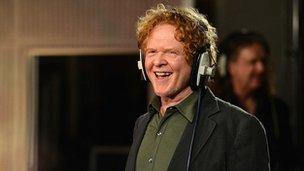
Hucknall praised Please, Please Me as a "beautiful" album
"I think everyone just expects it to be awful in the first place, don't they," he explains in the cafe before his performance. "Because some cover versions of pop songs are great, but when it comes to the Beatles, you either have to try and do it exactly the same as the original.
"But you never can, so you try and do your own take, which people hate because it's so personal to everybody."
So why bother taking part? "I don't know, maybe because it's not one of the big obvious ones, I think it's fun to hear people having a go and it's a lovely occasion.
The honour of the last song falls to the spectacular Beverley Knight - who vows to match "the raw and raucous" Twist And Shout. For many, this song encapsulates the energy of the early Beatles and it is a track which should not be attempted lightly.
"The Isley Brothers version resonates with me and my style of music," admits Knight. "But The Beatles didn't just do a faithful version, they took it and put their own vibe on it."
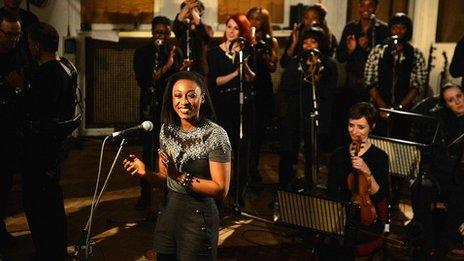
Knight went all-out with her vocals in the closing track Twist And Shout
"When you hear Lennon going through those notes, he's at full pelt."
An air of excitement precipitates the recording and, as promised, Knight stretches her vocal prowess to the limit, almost matching Lennon for sheer bloody-minded determination.
A watching crowd of people, who for the most part have been respectfully quiet in the moment following the previous live recordings, explodes in applause.
Fifty years on, in the hands of a new generation, the power of The Beatles still has the power to enthral.
Catch up with BBC Radio 2's 12 Hours to Please Me on the Radio 2 website. A film about the broadcast, Please Please Me - Re-making A Classic, is on BBC Four at 9:00pm on Friday, 15 February.
- Published11 February 2013
- Published11 February 2013
- Published2 October 2012
- Published7 October 2012
- Published3 October 2012